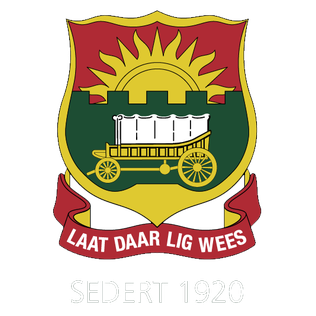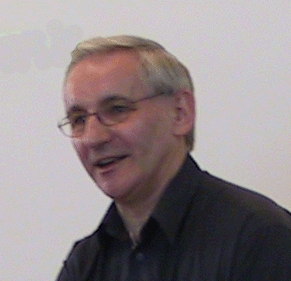Links
http://dcsoosthuizen.blogspot.co.uk/ (a memorial site to D. C. S. Oosthuizen) has further links to a number of the lectures
The D. C. S. Oosthuizen Memorial Lecture at Rhodes University, dedicated to the memory of the philosopher D. C. S. Oosthuizen, was founded in 1970 and is held annually. The lectures are organised by the university's Academic Freedom Committee.
http://dcsoosthuizen.blogspot.co.uk/ (a memorial site to D. C. S. Oosthuizen) has further links to a number of the lectures

The Progressive Federal Party (PFP) was a South African political party formed in 1977 through merger of the Progressive and Reform parties, eventually changing its name to the Progressive Federal Party. For its duration was the main parliamentary opposition to apartheid, instead advocating power-sharing in South Africa through a federal constitution. From the 1977 election until 1987 it was the official opposition of the country.


Stellenbosch University is a public research university situated in Stellenbosch, a town in the Western Cape province of South Africa. Stellenbosch is the oldest university in South Africa and the oldest extant university in Sub-Saharan Africa, together with the University of Cape Town - which received full university status on the same day in 1918. Stellenbosch University designed and manufactured Africa's first microsatellite, SUNSAT, launched in 1999.

Grey College is a semi-private English & Afrikaans medium school for boys situated in the suburb of Universitas in Bloemfontein in the Free State province of South Africa, it is one of the 23 Milner Schools. The sister school is Eunice High School (Bloemfontein).
Herman Max Gluckman was a South African and British social anthropologist. He is best known as the founder of the Manchester School of anthropology.
Frederik van Zyl Slabbert GCOB was a South African political analyst, businessman and politician. He is best known for having been the leader of the official opposition – the Progressive Federal Party (PFP) – in the House of Assembly from 1979 to 1986.

Irving R. Hexham is an English-Canadian academic who has published twenty-three books and numerous articles, chapters, and book reviews. Currently, he is Professor of Religious Studies at the University of Calgary, Alberta, Canada, married to Karla Poewe who is Professor Emeritus of Anthropology at the University of Calgary, and the father of two children. He holds dual British and Canadian citizenship.

General elections were held in South Africa on 29 April 1981. The National Party, under the leadership of P. W. Botha since 1978, lost some support, but achieved another landslide victory, winning 131 of 165 directly elected seats in the House of Assembly.
Jeugkrag was a short-lived South African youth group, surreptitiously funded by the apartheid government's department of Military Intelligence in an operation known as Project Essay. Led by Marthinus van Schalkwyk it operated exclusively on Afrikaans university campuses and sought to influence the political views of Afrikaans-speaking students.
Van Zyl is an Afrikaans toponymic surname. It derives from the Dutch surname Van Zijl, meaning "from Zijl" where Zijl is an archaic term for a waterway. Equivalent
The Tanner Lectures on Human Values is a multi-university lecture series in the humanities, founded in 1978, at Clare Hall, Cambridge University, by the American scholar Obert Clark Tanner. In founding the lecture, he defined their purpose as follows:
I hope these lectures will contribute to the intellectual and moral life of mankind. I see them simply as a search for a better understanding of human behavior and human values. This understanding may be pursued for its own intrinsic worth, but it may also eventually have practical consequences for the quality of personal and social life.
The following lists events that happened during 2010 in South Africa.
Professor Barend van Niekerk was a South African acclaimed jurist, a campaigning legal academic and a prominent human rights and anti-apartheid activist in South Africa in the 1970s and early 1980s. This "maverick law professor" was prosecuted twice by the South African state prosecutor and privately sued once, all such actions being based on his supposed contempt of court. He was indeed a fearless critic of the apartheid legal system, in particular of the judiciary's racial bias in setting death penalties, but also of imprisonment, torture and solitary confinement; freedom of speech; and the role of the judiciary.

Leon Louw is a South African intellectual, author, speaker and policy advisor. He is the executive director and cofounder of the Free Market Foundation, a nonprofit organisation ranked at number 123 in a CEOWorld's 2017 list of the most influential think-tanks in the world. He is a regularly featured speaker and writer in South African and international media. He has addressed many prominent organisations, including the US Congress hearings on apartheid, the King Center for Nonviolent Social Change, the Hoover Institute, and the United Nations.
Alexander Lionel Boraine was a South African politician, minister, and anti-apartheid activist.
The 1971 Argentina rugby union tour of South Africa was a series of 14 matches played by the Argentina national rugby union team in June and July 1971.
Daniel Charl Stephanus Oosthuizen was a South African philosopher, and an early Afrikaner voice against Apartheid. The main direction of his philosophical work lay in the field of epistemology and the philosophy of mind. He was more widely known in South Africa for his moral, political and religious essays, and was described by André Brink as a thorn in the flesh of the establishment. He was a confidant of Beyers Naude, who acknowledged him as having been one of the original group whose discussions and thoughts led to the founding of the Christian Institute of Southern Africa, of which he was both a founder member and a member of the Board of Management. He also contributed to the formation of the University Christian Movement.
The Dakar Conference was a historic conference between members of the Institute for Democratic Alternatives in South Africa (IDASA) and the African National Congress (ANC). It was held in Dakar, Senegal between 9 and 12 July 1987. The conference discussed topics such as strategies for bringing fundamental change in South Africa, national unity, structures of the government and the future of the economy in a free South Africa. The IDASA delegation from South Africa, participated in the conference in their private capacity and would later be condemned by the South African government for meeting a banned organization. The future indirect result of the conference was South African government talks with Nelson Mandela and his eventual meeting with P. W. Botha in 1989.
The Institute for Democratic Alternatives in South Africa (IDASA) later known as the Institute for Democracy in South Africa was a South African-based think-tank organisation that was formed in 1986 by Frederik van Zyl Slabbert and Alex Boraine. Its initial focus from 1987 was creating an environment for white South Africans to talk to the banned liberation movement in-exile, the African National Congress (ANC) prior to its unbanning in 1990 by the President F. W. de Klerk. After the South African election in 1994, its focus was on ensuing the establishment of democratic institutions in the country, political transparency and good governance. Caught up in a funding crisis after the 2008 global financial crisis, closed in 2013.
Slabbert is a surname of Middle Dutch origin, meaning either "herring fisher" or "glutton foul-mouthed person". Notable people with the surname include: